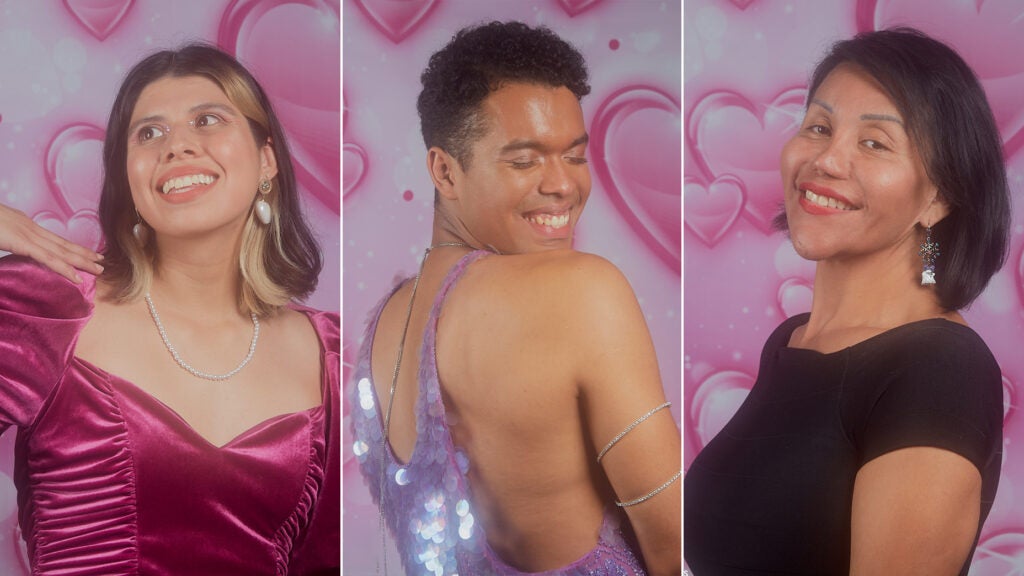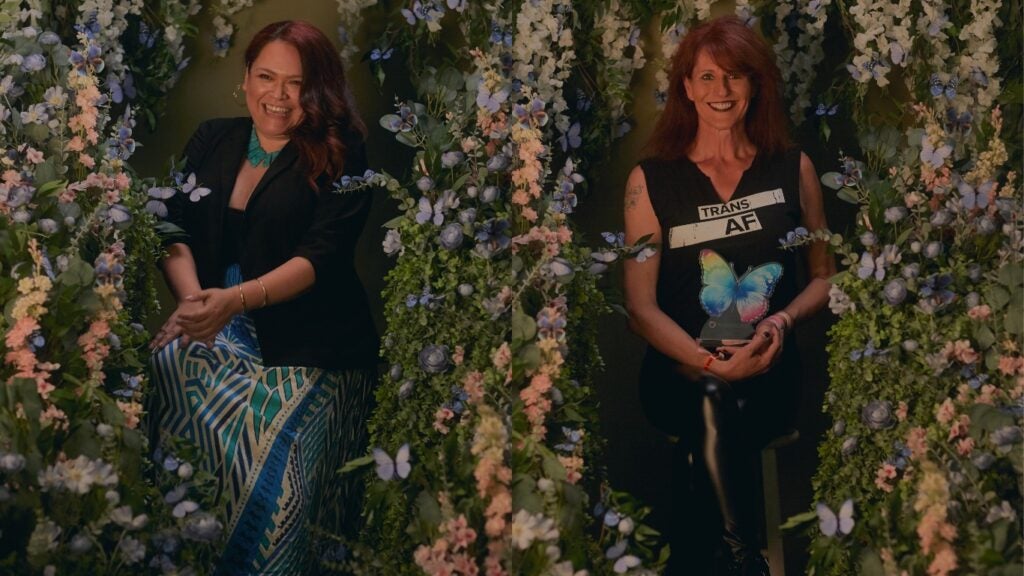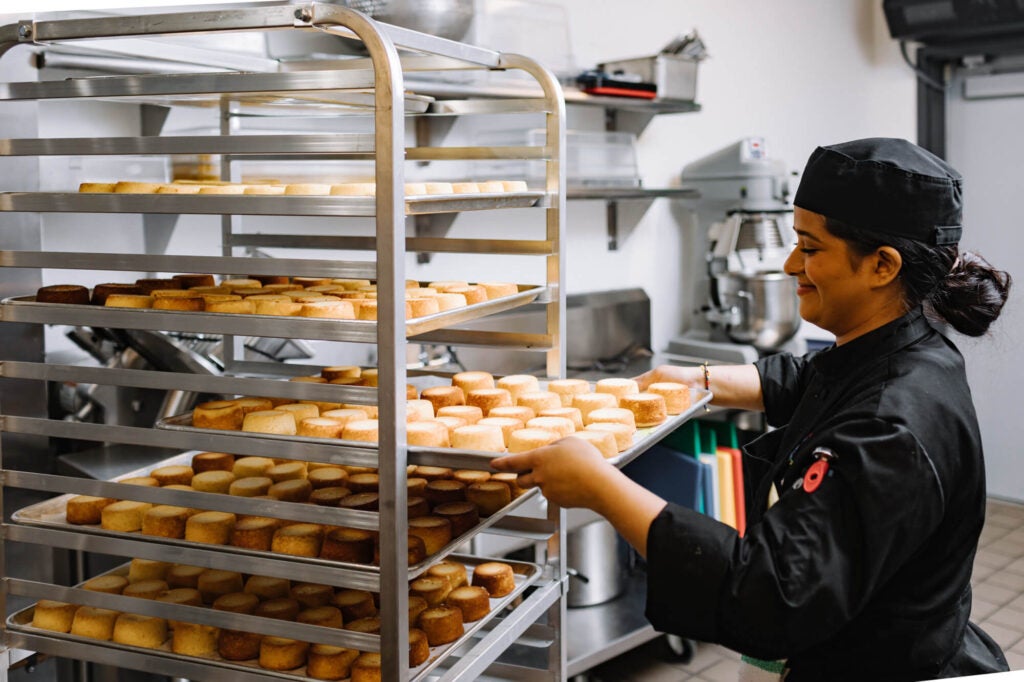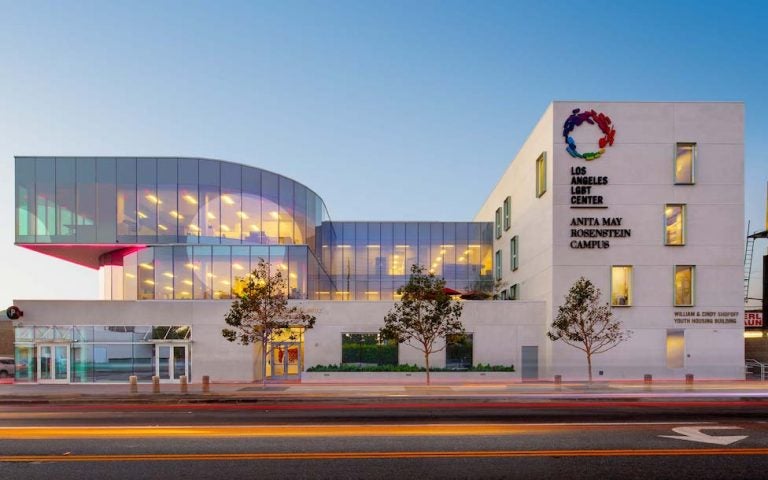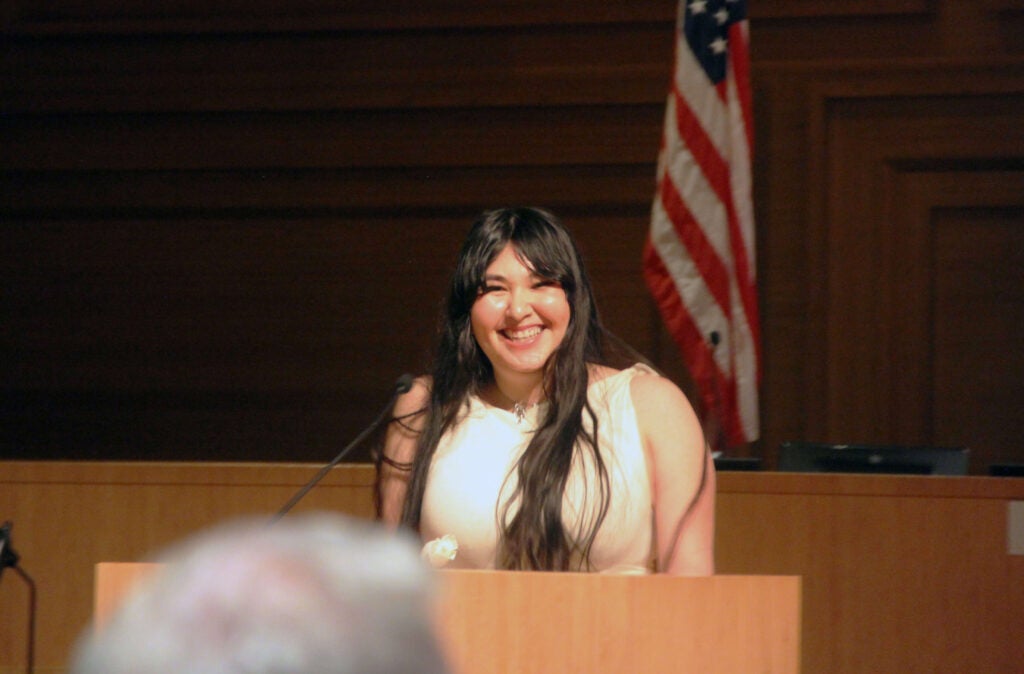Each November, the week leading up to Transgender Day of Remembrance is set aside to highlight and honor the experiences of the trans and gender-expansive community. In contrast to TDOR, which pays tribute to memories of those lost to anti-trans violence, Trans Awareness Week is about taking action, sharing the stories of those still with us, and uplifting the work of those who advocate for their community.
In honor of Trans Awareness Week, Mariana Marroquin, associate director of the Trans Wellness Center, and Gina Bigham, manager of Trans* Lounge and Education Empowerment Programs, sat down to discuss their relationship to the observance week and share some thoughts on how others can support the trans and gender-expansive community year-round.
“I wish that trans people didn’t need to have an awareness week. I wish that we could appeal to humanity—to compassion and understanding that every human is different,” Marroquin said. “We all have a different story, we’re all coming from different places. We sound and look different, just like everyone else. My hope is that—by being out and telling people my story and my challenges and my contribution to society—the next generations don’t have to explain themselves, they can just be part of society and thrive.”
Read the full conversation with Marroquin and Bigham below.

What does Trans Awareness Week mean to you personally? How do you think of it in relation to Trans Day of Remembrance?
Gina Bigham: Well, it used to be that November was Trans Awareness Month. So, you know, it morphs and it shifts and it changes. But back when I was coming up, Trans Day of Remembrance was pretty much the only event on the trans calendar each year. And amplifying that event turned into, how do we give voice to what’s going on in the community beyond just that one day? I feel that every week should be Trans Awareness Week. At Trans* Lounge—and I’m sure at TWC as well—we focus on our awareness and our visibility each and every day. But this week, in particular, is important for folks outside of our community to really understand the struggles and the heartbreak of losing community. How do we learn from that? How do we grow from that? How do we become inspired through that?
Every week should be Trans Awareness Week. At Trans* Lounge—and I’m sure at TWC as well—we focus on our awareness and our visibility each and every day.
Gina Bigham, Trans* Lounge
Mariana Marroquin: I wish that trans people didn’t need to have an awareness week. I wish that we could appeal to humanity—to compassion and understanding that every human is different. We all have a different story, we’re all coming from different places. We sound and look different, just like everyone else. My hope is that—by being out and telling people my story and my challenges and my contribution to society—the next generations don’t have to explain themselves, they can just be part of society and thrive.
On the other hand, when we talk about Trans Day of Remembrance, I think that it’s important to me that we cannot hide the reality that many people in this country and around the world are treated differently. Violence against trans people is a reality. When we celebrate Pride, we can never forget that members of the community are still struggling and are still fighting to survive. As a trans woman, that is something that is always in my mind. Gina and I have organized many, many remembrance days over many years. And I always look at their pictures and their stories, and in the back of my head it’s like, When is my picture going to be there? Who is going to read my name? I think that’s why, for me, as horrible as it can be to name all of these people and the way they were taken away, we still have to do it, because we owe it to them. We didn’t fight enough for them. We weren’t vocal enough for them. That’s why sometimes when I want to take a break from being trans or from being myself, I come back the next day thinking about the person who is suffering, who doesn’t have access to the same rights that we have. We need to make other people aware that we exist, that we are loved, and that we have rights. We’re still struggling, the fight is not over.

What are some things people still misunderstand about the trans and gender-expansive community?
Gina Bigham: That we are somehow different. I always say that being trans, being gender-expansive, it’s kind of like being left-handed. People are left-handed, but they don’t have a separate line or a separate bathroom. It’s just a part of life. It’s just one slice of a very large pie. As Mariana said before, we just want to thrive, we just want to live our lives. In that regard, we’re the same as anyone else. It’s exhausting to have to constantly be fighting for your humanity, for your existence. Something like 700 anti-trans and anti-LGBTQ+ bills have been brought forth in 2023? We’re taking steps forward, and we’ve had a lot of progress, but with visibility often comes that pushback. I remember how exciting it was when President Obama said “transgender” on TV. It was like, this huge historic moment. But I also knew that the lights on us were gonna get brighter. Now, we’re on the lips of right-wing media every night. But they don’t know us; they’re just going off talking points because we’re an easy target. It’s not fair, obviously, and it shouldn’t be this difficult, but it is. So we will continue to fight, and we will continue to make people aware.
It is impossible for me to be invisible. And the fact that I cannot be invisible makes me want to be someone who is always appealing to compassion.
Mariana Marroquin, Trans Wellness Center
Mariana Marroquin: When I was growing up knowing that I was different, there was a time when I wanted to be invisible. I didn’t want people to know that I existed. But I realized that it is impossible for me to be invisible. And the fact that I cannot be invisible makes me want to be someone who is always appealing to compassion, who is always appealing to the things that we have in common with other people. As an immigrant woman, I came to this country to survive, and many other people after me are doing the same thing. And we have people that are moving to California from other states to be able to have a life. We’re not asking for any special treatment, we are asking for the same rights that everyone else has. We are the people bringing in the food for our families, putting our brothers and sisters through college, buying properties for our parents, taking care of our elderly. These are universal things that we have in common with other people. But because we are trans, because of the way we are portrayed, we are seen as strange people who only go out at night and go after other people. And that is so far from reality. That is so far from who we are and what we want. I want people to give themselves a chance to open their minds and their hearts to learn about anyone that is different. This also applies to Indigenous people, Black people, people living with disabilities, and other minorities. Give yourself a chance to learn and you’re going to be a better person and more understanding. That’s all I want. I don’t want anything else.

What do you wish more people knew about your work as service providers?
Mariana Marroquin: My job as a service provider is personal. I am the community that I serve. I could lose my job tomorrow, and I’d be the one waiting in line to see a provider or asking for emergency help. I’ve been lucky that I’ve been doing this for more than 20 years, but within the LGBTQ+ community, we’re still facing disparities. We don’t get those seats at the decision-making tables, which is something that would not only lead our community in a better direction, but would also make the LGBTQ+ movement more authentic to what we are fighting for. Because liberation should be for all of us, not only for a few people with privilege. We all understand how it feels to be discriminated against and how it feels to be left behind.
I am the community that I serve. I could lose my job tomorrow, and I’d be the one waiting in line to see a provider or asking for emergency help.
Mariana Marroquin, Trans Wellness Center
What can people do to help uplift your work?
Gina Bigham: Get involved and, as Mariana said, commit to learning and opening your mind—opening your heart to who we are. When it comes to Trans Awareness Week, Trans Day of Remembrance, everybody’s laser-focused on all of these trans issues. But on November 21, it’s, see you next November! I always say that everyone can be an activist, whether that’s asking people to sign a petition, or organizing a protest or a march. Even if it’s one on one and you change one mind at a time, that’s one more mind that’s changed. Within the community, it can be sharing stories, being present, or doing little things like taking surveys, doing research studies. Keep asking questions, keep reading the news, and be aware. Get involved, volunteer, come to Trans Pride, volunteer at the Trans Wellness Center. Every year at Trans Pride, volunteers will come up to me when the event is over and go, “Can I stay, please? I’ve never seen such kindness and such community before.” It happens all the time. And I think it’s because it’s their first time in a trans space, and they’re just so blown away by the community and by the love and the outpouring of support. It’s getting involved and really understanding that we are just human beings looking to live our richest and fullest lives.

Every year at Trans Pride, volunteers will come up to me when the event is over and go, ‘Can I stay, please? I’ve never seen such kindness and such community before.’
Gina Bigham, Trans* Lounge
Mariana Marroquin: I also think that it’s important to uplift the people in your life. Your trans neighbor, your trans friend, celebrate that they’re here. Listening to Gina, you are talking to a woman who has started programs from the ground up. We are two successful fighters who have so much to give. But there are so many people just like us who don’t get the chance to tell their story. Something that happens a lot is we pick one person, and then we put that person everywhere. And for me, it’s like, no, we are so many out here just doing our jobs and doing our part. It’s not about making superheroes, it’s about appealing to kindness by finding things that we have in common. We all have that power to be kind. We all have that power to transition into a better you every day. Transition should be for every human. I want to be a better person, a better me, tomorrow. I think that is the beauty that Gina was talking about when people come into trans spaces. We find that joy in the little things that people take for granted. Instead of people just pointing out what is different and what bothers them about us, they should find those things that they take for granted and can give them so much joy. We should remind them that life is beautiful, and that living this life—having challenges and facing adversity—is just part of it. There will be another day tomorrow, we just have to go out there and show up.
For the full schedule of events for this year’s Trans Week of Awareness, click here.
Read More
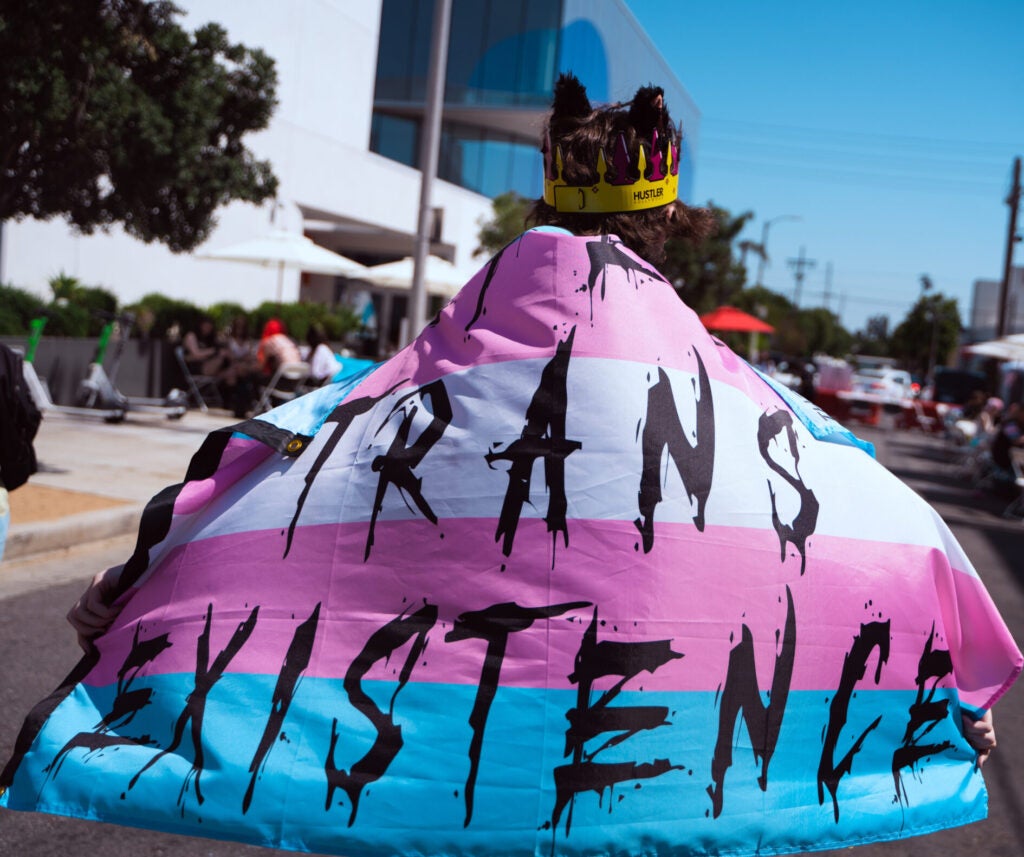
California Judge Blocks Policy Targeting and Outing Trans Students
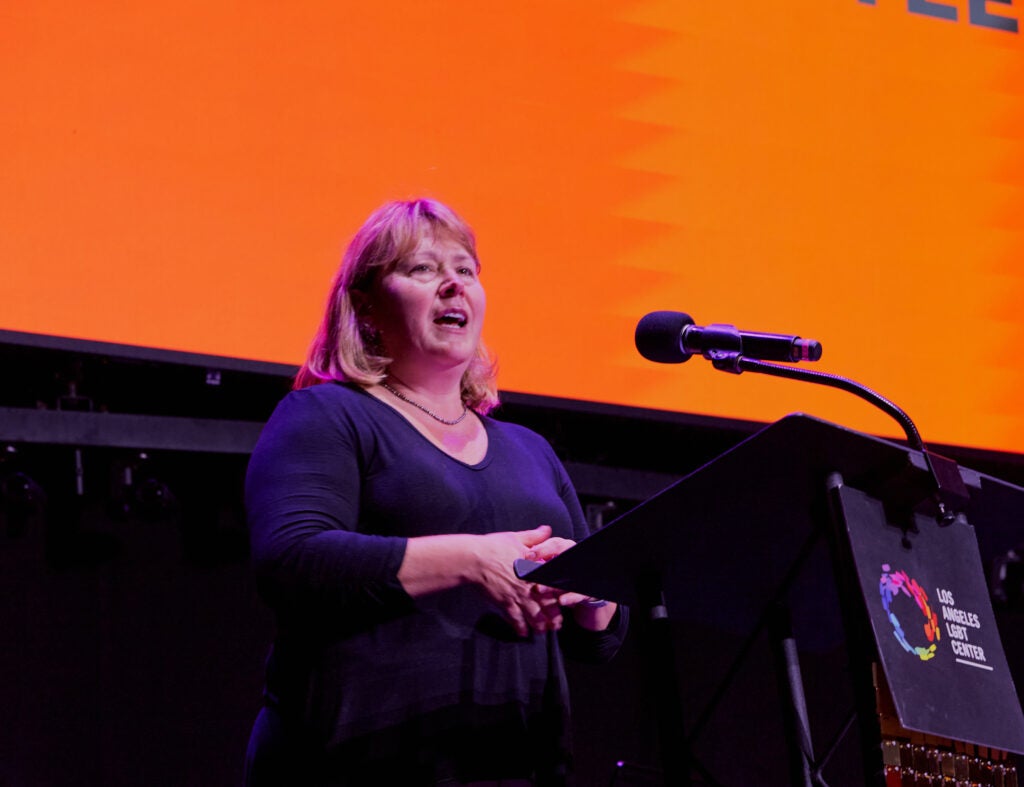
Cynthia “Cyndi” Harrison Honored with Inaugural Sharon Franklin Brown Award for Employee Excellence, Celebrating 24 Years of Service
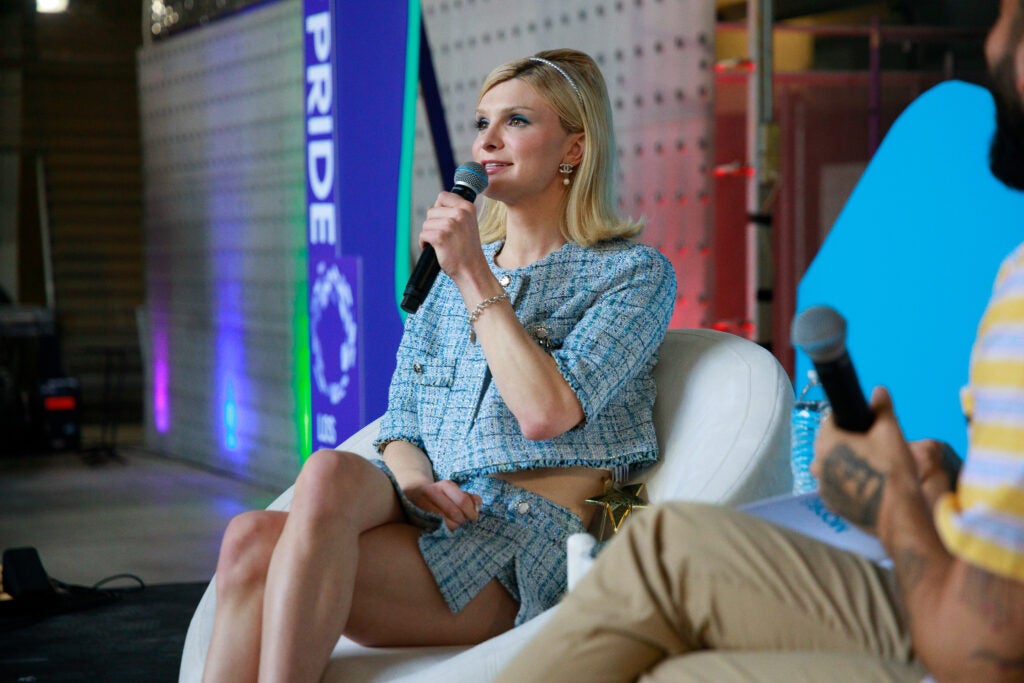
Dylan Mulvaney Talks Dealing with Online Hate at Models of Pride: “They Can't Comprehend a Trans Person Being Happy”
